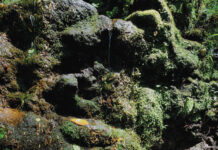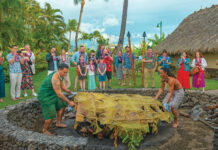To prevent their depletion, natural resources were rested and replenished through kapu—bans on their use—established by the ali‘i (chiefs). “Their philosophy was one of responsibility and maintenance, to keep things in equilibrium,” says Ed Lindsay, a Native Hawaiian conservationist. “You don’t want to kill a fish when it’s able to lay millions of eggs.”
“Conservation practices were observed in fishing, as well as in hunting and gathering of wild plants,” writes Kane, “possibly a lesson learned from the disappearance of the large flightless birds early settlers had hunted to extinction. Fishing of aku [skipjack tuna] and kawakawa [bonito] was permitted during the first six months of the year, but ‘opelu [mackerel] was kapu. ‘Opelu could be taken in the last six months, but not aku and kawakawa. Protective kapu were placed on certain other fish during their spawning season.”
Breaking the kapu not only prevented rejuvenation of the natural resources, it offended the ali‘i and upset the gods. “The kahuna [elders] and konohiki [land chiefs], therefore, as the voice of the gods on earth, were obeyed,” writes Gon. “The underlying idea was that care for the land and sea was rewarded by plenty from the land and sea.”
Survival as a people meant putting the needs of the many before those of the individual. “Unlike in modern society which values . . . individual rights,” writes Kane, “Polynesians placed the clan’s interest [highest]. Individual expression or initiative that did not contribute to the welfare of one’s clan was discouraged if not punished.”
There was no concept of owning property in ancient Hawai‘i—even ali‘i considered themselves overseers of the land—and no word for trade. Exchanges of goods and services were based on gift-giving and reciprocity. “It wasn’t for any kind of ulterior motive,” says Lindsay. “People living in the mountains gave feathers; people living near the ocean gave fish. They gave whatever they had.”
***





